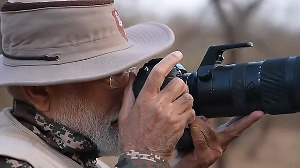'Pakistan's nuclear programme gives us very little confidence that it will remain secure,' a senior Indian official notes on the eve of the second Nuclear Security Summit in Seoul.
The Iranian government has promised assistance in the investigation into the attack on the Israeli diplomat in New Delhi last month.
"When we told the Iranians these are the names of the people who did it, they said, 'Is that so? We will help you'," a senior government official in the know told Rediff.com
"This is what is happening now," the official added, "what will happen in the future we don't know."
Asked about the claim that the explosives used in the attack arrived in New Delhi via Iranian embassy diplomatic pouches, the official appeared sceptical and felt it was up to the Delhi police to prove that theory.
India, a government official said, has told the Iranians, the Israelis and the Americans that negotiations -- with the International Atomic Energy Agency's involvement -- are the only way to resolve the current crisis over Iran's nuclear programme.
"No one -- not the Israelis nor the Americans -- have said that the Iranians are building a nuclear weapon," the official added. "The Israelis believe the Iranians are in that 'zone of immunity' where they could easily build a bomb."
"An attack (on Iran) would be madness!" the official felt, "Hopefully, reason will prevail."
Asked about Pakistan's nuclear facilities and the fear that it could come under attack from terrorists in that country, the official conceded, "Pakistan's nuclear programme gives us very little confidence that it will remain secure."
The official felt one of the biggest threats confronting Pakistan's nuclear programme is the "insider threat," the possibility that someone with access to its nuclear arsenal could spirit away enough material and provoke a terror attack.
The official was peeved by this reporter's inquiry if the Central Industrial Security Force -- which has been entrusted with the responsibility of guarding India's nuclear installations -- was up to the task, and whether India needed to set up a separate nuclear security protection force.
"Don't presume what you don't know!" the official exclaimed, raising the impression that while the CISF guards the outer perimeter of India's nuclear installations, the innards are protected either by Indian Army or National Security Guard commandos.
"Our nuclear material is very secure, very tight!" the official emphasised, adding further for emphasis, "very tight!"
Nuclear terror and the imperative need to prevent it will be at the heart of the two-day Nuclear Security Summit in Seoul, which begins on Monday, and will be attended by over 50 heads of government and State including Prime Minister Manmohan Singh who arrived in the South Korean capital on Saturday evening.











 © 2025
© 2025